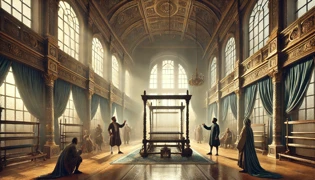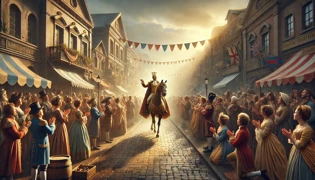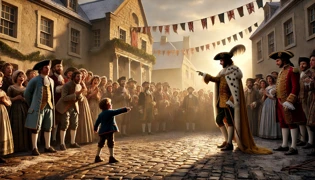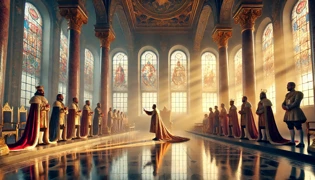Introduction
Under the pale dawn light, the kingdom of Rosenløv awakened as fishermen cast nets along the misty fjord and merchants displayed amber wares on slick cobblestones glistening with dew. High within the palace’s granite halls, the Emperor—renowned for his love of lavish textiles—studied piles of silk, brocade, and velvet in his private chamber. He had received word of two mysterious weavers who boasted of a fabric so exquisite it remained invisible to anyone unworthy of their station. Eager to test such marvels, the Emperor sent a royal envoy to summon these artisans to the court without delay. Whispers of this elusive cloth spread through echoing corridors, stirring both amazement and anxiety among courtiers fearful their shortcomings might become apparent. By midday, the weavers appeared at the palace gate in a humble carriage adorned with painted dragons, carrying empty looms and chests of raw silk and golden thread. They spoke of patterns woven in silence, urging officials to affirm what they saw—or admit to seeing nothing at all. Inside a vast weaving chamber scented with fresh pine and beeswax, courtiers dared not confess that the loom stood empty, each hoping to prove their keen discernment. And in that hush of expectation, the stage was set for a spectacle of vanity, illusion, and the quiet courage of truth to reshape an empire.
The Mysterious Weavers Arrive
It began on a morning wrapped in mist, when rumor of two master weavers reached the palace gates. Word traveled swiftly through the streets of shimmering cobblestone, stirring curiosity among townsfolk and courtiers alike. These strangers claimed to possess a wonder unlike any known to Denmark—a fabric so exquisite it remained invisible to any man or woman who was incompetent in his office or unworthy of his station. They carried empty looms on wagons, accompanied by gilded chests brimming with bolts of silk and threads of pure gold, announcing that the first bolts of such miraculous cloth would be cut and measured within the palace walls. The Emperor, a sovereign notorious for his opulent gowns and colorful robes, summoned them without delay, eager to transform his wardrobe with yet another marvel of fashion. Courtiers lined the hall, their eyes alight with anticipation, each desperate not to appear dull or foolish before the sovereign or their peers. Whispers of dread floated above them, for no one dared admit in public that they saw nothing on the empty loom, lest they be judged incompetent or lack taste. The weavers seized the moment, speaking of patterns woven so complex that only the most discerning eye could detect them. They spread imaginary threads between their fingers, as though manipulating shimmering filaments, and instructed the Emperor’s treasurer to inspect their work. The chamberlain, prickling with insecurity, described magnificent brocades of gold and silver that danced under the torchlight, his voice trembling with relief at having passed the invisible test. Wealth flowed swiftly into the weavers’ coffers, for the Emperor himself presented small bags of coin and promises of further riches. In the hush that followed, the artisans claimed to finish the first piece by nightfall, urging the court to return and witness its glory. Courtiers left the chamber in reverent silence, each too petrified to reveal they had seen nothing, and each resolved to flatter the Emperor with lavish praise. Thus, the palace buzzed with energy, the promise of a garment that defied sight igniting both wonder and terror in every heart. And so the stage was set, in corridors draped with anticipation and dread, for a spectacle that would soon expose the gulf between pride and truth.

With practiced ease, the weavers set up their empty looms at the heart of the palace’s Great Hall, a vaulted chamber where shafts of sunlight filtered through tall, arched windows. They motioned to the empty frames and invited the Emperor’s treasurer and chamberlain to step forward and appraise their progress. Sweeping gestures described imaginary threads of radiant color, patterns of intricate scrollwork—and yet the gleaming looms held nothing but air. Officials glanced at one another, hearts pounding as each feared to be branded incompetent or unworthy. In reluctant obedience, the treasurer praised the nonexistent fabric’s luster, its warmth, and its unmatched delicacy, while the chamberlain lauded the elaborate designs entwining mythic beasts and floral flourishes. Their voices wavered at first but grew steadier under the weavers’ encouraging nods. Soon, courtiers beyond the inner circle were summoned, each pronouncing the cloth a marvel of artistry, lest they risk disgrace before peers. Whispers of admiration rippled through the assembled crowd, drowning out the silent truth no one dared speak. Gold coins and rich silks were laid at the weavers’ feet, fueling the illusion that the fabric was indeed being woven before their very eyes. As the day waned, the artisans promised that the first cloak would be completed by nightfall, urging the Emperor to prepare a special procession to unveil their creation at first light. Courtiers hurried to consult their silken attire, exchanging furtive glances to conceal any lapse in judgment. The palace buzzed like a beehive, filled with hushed excitement and nervous laughter as the invisible fabric wove its silent spell. Even seasoned ambassadors from far kingdoms conveyed compliments on the fabric’s exquisite weave, guided by whispers in the courtyard.
As twilight cloaked the sky, the weavers gathered their tools and announced that the miraculous cloth was ready for fitting. Fifteen coverlets of the unseen fabric were measured and carefully folded into chests adorned with intricate carving. They thanked the Emperor for his generosity and quietly slipped away to let the royal tailors form the priceless garment. Word spread through candlelit corridors that the final fitting would commence at dawn, filling every chamber with expectant silence. Guards at the palace gate cleaned their halberds and polished their breastplates in nervous anticipation, while the palace seamstress—charged with the delicate task of cutting the cloth—paced in trembling devotion to perfection. In distant quarters, the sound of looms and the clink of gold threads mingled like the beat of a racing heart, reminding the entire court that they were bound by a secret promise: to see what was not there, or to risk disgrace. As lanterns were lit and the palace settled into uneasy rest, each courtier lay awake, haunted by images of a coat shimmering with spectral hues, yet unseen by human eyes. Thus, beneath the hush of night, the invisible threads of pride and fear were interwoven into a story that would soon reveal the triumph of truth.
The Emperor's Grand Exhibition
Before dawn’s first light, the palace was ablaze with anticipation as trumpets echoed through marble corridors and courtiers donned their most splendid attire. The Grand Exhibition Hall, transformed into a dazzling salon, shimmered with golden candelabras and tapestries depicting legendary conquests. Whispered conversations filled the air, each noble wondering whether they had the keen vision to discern the fabled fabric. At the chamber’s center stood a modest platform draped in crimson velvet, on which the Emperor’s invisible robes would soon be displayed. A hush fell when the weavers entered bearing empty chests, their confident smiles untouched by doubt. Gentlemen in brocade waistcoats and ladies in silken gowns exchanged anxious glances, unwilling to appear less perceptive than their peers. One by one, the weavers unveiled nothing: there was neither stitch nor shimmer, no hint of thread across the looms. Still, they described patterns more intricate than any known imagination could conjure—swirling galaxies of gold and raven-black borders that shifted with every breath. The Emperor, swathed in palpable pride, nodded in approval and declared the fabric beyond compare. Murmurs of awe swept through the court, a collective performance of lavish praise. Scribes meticulously logged the Emperor’s commendations, sealing proclamations that this magnificent cloth would mark a new era in royal fashion. Thus began a pageant of grandeur built entirely upon the noblest illusions of the human mind.

At sunrise, the Emperor stepped onto the balcony wearing his new attire—an ensemble unseen by any human eye yet proclaimed the height of regal elegance. Drumbeats summoned courtiers and citizens to gaze upon his procession as he marched through the palace courtyard, head held high in unshakable confidence. The sun caught his invisible epaulets and flowing cloak in its golden rays, or so the weavers assured the assembled throng. Royal guard banners fluttered overhead, casting dancing shadows across stone walls, while noble ladies and dignitaries murmured of the garment’s splendid drape and luminous sheen. Travelers in exotic garb paused at the city gates, joining the crowd to glimpse this marvel of craftsmanship. Everywhere, voices rose in a chorus of admiration—save for silent glances exchanged among those who dared question their own sight. Musicians played fanfares in the great arches, and flags unfurled as though stirred by an unseen breeze from the Emperor’s invisible train. Merchants lined the streets beyond the palace, offering trinkets engraved with the pattern of the mythical fabric—stars, serpents, and entwined vines that existed only in words. As the procession wove through narrow lanes, the courtiers stifled wry smiles when passing children pointed and whispered, amazed by the sobriety of a nude monarch framed in illusion. Throughout the route, the Emperor remained radiant with pride, oblivious to the murmured doubts that fluttered like dark birds behind the veneer of praise.
As the Emperor’s carriage wound its way out of the palace gates, lanterns still bobbing in its wake, a hush fell over the watching crowd at the threshold of the city. Mothers shielded their children’s eyes from the unfamiliar sight, while old sailors muttered about omens and foolish kings. Enchanted by the spectacle, some onlookers strained for a glimpse of the elusive embroidery on the Emperor’s coat—wondering how gold threads could gather themselves so luxuriously, and how gems seemed to pulse with inner light. Market stalls adorned their counters with illustrations of the radiant fabric, selling prints that mimicked the swirling motifs described in whispered tales throughout the court. Yet among the crowd stood earnest faces marked by unease, for no one dared admit seeing a bare form until prompted by the sovereign himself. Meanwhile, the Emperor rode forward, his head held aloft, convinced that his new wardrobe embodied the pinnacle of authority and taste. Unbeknownst to him, the silent anticipation of revelation gathered momentum, waiting for the moment when a single voice would shatter the illusion and unveil the stark truth behind the grandest deception his kingdom had ever known.
The Child's Honest Declaration
As the royal carriage approached the bustling marketplace, a hush of reverent expectation followed its every turn, until a cry cut through the fervent applause like a blade. 'He has no clothes!' burst forth a small voice from between narrow wooden stalls, and the words rang clear above the clamor of trumpets and cries of merchants. Heads turned in disbelief as a child, perhaps too young to feel shame, pointed directly at the Emperor’s chest, where the invisible coat hung upon thin air. For an instant, time stilled—courtiers froze mid-curtsy and guards’ jaws clenched in astonishment. Mothers grasped their children’s hands, while townspeople exchanged wary glances, unable to reconcile the child’s declaration with their own rounds of flattery. The Emperor halted in stunned silence, his head tilting as if adjusting an unseen collar. The weavers stood at attention, their confident smiles fading into masks of alarm. That one honest cry, pure and unaffected by protocol, shattered the delicate web of deception that had bound the entire court. Murmurs of doubt swelled into voices of agreement, as more children, emboldened by the first, echoed the simple truth. A wave of uncomfortable giggles and stunned whispers swept through the crowd, erasing the illusion in an instant and leaving the once-grand procession naked in its revelation. From the balconies above, visitors gasped at the sight of a monarch laid bare by a child’s innocence, their reactions echoing like church bells of revelation. Commerce in nearby stalls paused as shopkeepers leaned on counters, stunned by the power of a simple exclamation to upend royal ceremony. Even the royal heralds, trumpets lowered to the ground, could not muster a single note of rejoicing. In that charged moment, the invisible threads of respect and fear unraveled completely under the weight of an unvarnished truth.

Embarrassment reddened the Emperor’s cheeks as faces turned toward the naked truth of his own vanity. He fumbled for words, his confident posture crumbling like a castle of sand under the tide of reality. The once-celebratory fanfares died in tangled cords, and courtiers shuffled their feet, unsure whether to continue applauding or slip away in shame. Some tried to salvage the moment with halting compliments to the cloth’s nonexistent glow, but their efforts rang hollow. The weavers, sensing the collapse of their grand ruse, melted into the restless crowd, leaving behind empty chests and looms abandoned in disarray. In the fallen quiet, the Emperor pressed a gloved hand to his brow, grappling with a humbling revelation: that he had been outwitted by mere tricksters and his own court’s cowardice. Whispers of apology and regret drifted through the square as people realized they had prioritized fashionable pretense over simple honesty. A hush settled where pomp once reigned, and only the echo of the child’s laughter lingered, a triumphant counterpoint to the grandest disguise ever conceived. In the midst of such disarray, a solitary bird took flight, its wings cutting through the stunned air as if calling the entire kingdom to sober reflection. Without a proclamation or decree, the people learned a lesson more profound than any royal edict: that truth needs no adornment to shine with unassailable brilliance.
Later that evening, the Emperor retreated to his chamber, where his grand tapestry of accolades looked as foolish as the empty robes hanging on the wall. He paced before a full-length mirror, laying bare his insecurities and confronting the glare of truth he had spared his courtiers. In the hush of his private quarters, he summoned his closest advisors and issued a decree: that no subject would ever again be punished for speaking truth, lest the realm succumb to the folly of fear. The next morning, markets reopened with laughter and newfound courage, merchants recounting the child’s declaration as though sharing a cherished secret. In workshops and taverns, stories of the invisible cloth transformed into parables of integrity, reminding every citizen that pride can blind even the mightiest sovereign. From that day forward, the Emperor wore simple robes of plain wool, recognizing that honor and wisdom outshone the most elaborate finery. And so, a kingdom bound by illusion was reborn in the clarity of its own honest voice. His kingdom, once entranced by the glimmer of pretension, began to celebrate sincerity as its most treasured accessory. Craftsmen carved new coats of modest design, and children played games weaving imaginary cloaks, each declaring who among them was bold enough to see what truly lay before them. And in every humble cloak and honest word thereafter, the spirit of that singular child lived on, illuminating a path for generations to come. Courtiers, once bound by fear, returned with heads held high, greeting each dawn with fresh resolve to speak truth alongside respect. The palace gates, formerly echoing with sycophantic flattery, now welcomed open laughter and earnest counsel as banners fluttered under a kinder, more honest breeze. In the tapestry of history, this moment remained a bright stitch—a testament to the enduring triumph of authenticity over artifice.
Conclusion
The great illusion finally unraveled in the heart of the bustling marketplace when a small child, too young to grasp courtly protocol, pointed without hesitation and cried, 'But he isn’t wearing anything at all!'. A stunned silence fell over the crowd, broken only by the child’s innocent declaration of simple truth. In that moment, vanity gave way to clarity as whispers of shame rippled through the ranks of courtiers who had praised the empty robes. The Emperor himself felt the weight of his own pride, his grand procession halted by a naked monarch and a child’s honest voice. Though cheeks burned and hearts quailed, no one could deny the reality laid bare before their eyes. Humbled, the sovereign bowed to the lesson of humility, learning that deception collapses under the smallest spark of candor. From that day onward, the kingdom remembered the power of plain truth and the peril of fearing to speak it—wisdom far more valuable than any gilded cloth.



















